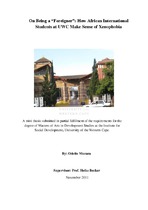| dc.description.abstract | This thesis is an exploratory study of how African international students at the University of the Western Cape (UWC) in South Africa experience xenophobic attitudes and behaviours, and how they make sense of it. In post-apartheid South Africa, the xenophobia phenomenon has become an intensely debated issue. While numerous researchers have attempted to investigate the forms of xenophobia and the underlying reasons of aggressive behaviour towards foreign migrants in South Africa, very few studies have been done thus far on xenophobia at South African Higher learning institutions. In this research I am interested in finding out whether international students particularly African international students at UWC, encounter xenophobia on campus and outside the academic environment. An Ethnographic study was conducted on and off the UWC campus, which involved participant observation, in-depth one on one interviews, focus group and diaries which were kept by key informants to record their daily experiences. The research participants were ten UWC African international students, who stay on and off campus, from different levels and field of study. The strategy to analyse the data was framed on basis of inductive approach. Moreover, informal discussions were used as a source of data to this study and I also made use of my own experiences as of one of African international students at UWC. The findings pinpoint that xenophobic experiences of African international students inside and outside the university include exclusion, discrimination, verbal abuse, blames and harassments, as well as stereotypes. The findings also show that xenophobic violence is experienced off campus. Although the violence experience was reported by one student out of the research participants, this issue is still pertinent enough to be considered. The central argument of the thesis is that while no violence against foreign African students has been reported from UWC, this does not mean that there would be no instances of xenophobia there. Instead, this research shows that because at higher learning institutions we find mostly people of the social middle classes, xenophobia is expressed in subtle ways through negative attitudes and behaviours towards foreign students. | en_US |

